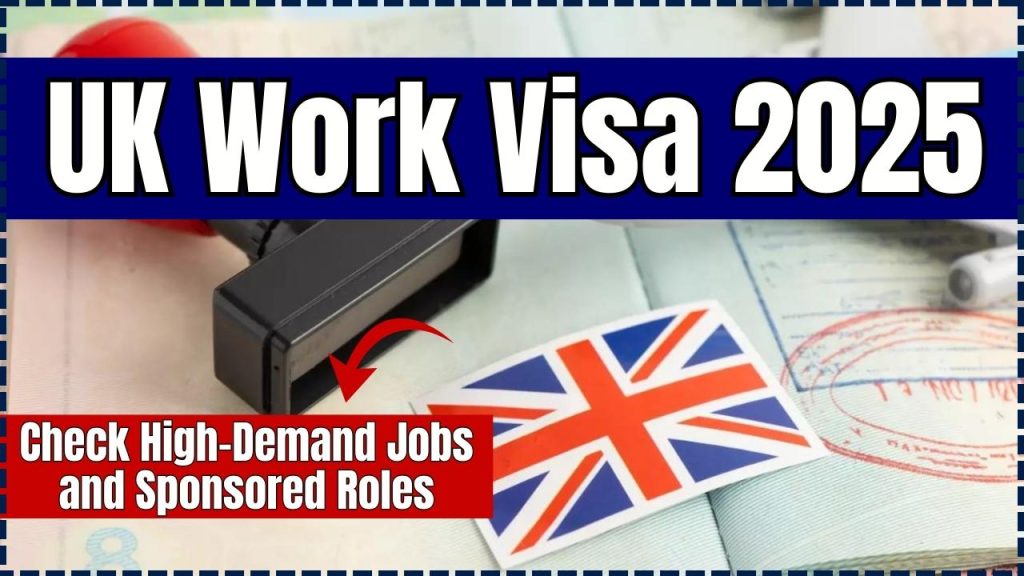
UK Work Visa 2025: The UK is a top destination for skilled professionals looking to work abroad. If you are considering applying for a UK work visa in 2025, it’s essential to understand the process, high-demand jobs, and sponsored roles available. With recent updates, including the Immigration Salary List (ISL) replacing the Shortage Occupation List (SOL), knowing where opportunities exist can give you a competitive edge.
UK Work Visa 2025
| Key Topic | Details |
|---|---|
| Visa Type | Skilled Worker Visa |
| New Policy | Immigration Salary List (ISL) replaces SOL |
| Salary Threshold | Reduced to 80% of the general threshold for ISL jobs |
| Industries in Demand | Healthcare, Construction, Creative Arts, IT, Engineering |
| Sponsored Jobs | Available through the Register of Licensed Sponsors |
| Official Resource | Gov.uk Skilled Worker Visa |
The UK work visa process in 2025 has become more accessible, especially for professionals in high-demand fields like healthcare, construction, and IT. By following the steps outlined and applying for sponsored roles through licensed employers, you can increase your chances of securing a UK work visa successfully.
Understanding UK Work Visas in 2025
Changes to the Immigration System
In 2024, the UK government introduced the Immigration Salary List (ISL), replacing the Shortage Occupation List. The ISL focuses on key industries facing workforce shortages, allowing eligible job roles to be filled with reduced salary thresholds.
This change makes it easier for foreign professionals in these fields to qualify for a visa and for UK businesses to recruit talent without excessive bureaucracy. The UK Home Office continues to revise and expand the ISL as labor market demands fluctuate, ensuring that industries with shortages can attract skilled workers from abroad.
Moreover, the Skilled Worker Visa now has streamlined application processes and digital verification systems, reducing paperwork and processing times.
High-Demand Jobs in the UK (2025)
1. Healthcare and Social Care Jobs
The UK’s National Health Service (NHS) and private healthcare sectors require skilled professionals, including:
- Nurses and Midwives
- Medical Radiographers
- Social Care Workers
- Biological Scientists and Biochemists
- General Practitioners and Consultants
Example: A qualified nurse from India can apply for a sponsored job with an NHS trust, meeting the visa requirements under the ISL.
With an aging population and a continued demand for healthcare services, the UK government has prioritized hiring medical professionals. Those with specialized skills such as oncology, neurology, and emergency care have an even greater advantage in securing positions with visa sponsorship.
2. Construction and Engineering Roles
The UK is experiencing a construction boom, increasing demand for:
- Bricklayers and Roofers
- Carpenters and Joiners
- Civil Engineers
- Surveyors
- Structural Engineers and Project Managers
Example: A civil engineer from South Africa could secure a job with a licensed UK employer and benefit from an easier visa application process.
With infrastructure projects expanding across major UK cities, engineers and skilled trade professionals remain in high demand. Large-scale urban renewal projects and government-funded housing developments continue to drive the need for workers in this sector.
3. IT and Digital Technology Jobs
With growing digital transformation, tech jobs remain in high demand, including:
- Software Developers
- Cybersecurity Experts
- Data Scientists
- Cloud Computing Specialists
- AI & Machine Learning Engineers
Example: A software engineer from Brazil can apply for a skilled worker visa with a job offer from a UK tech firm.
The UK’s tech industry is booming, with London, Manchester, and Birmingham emerging as key hubs for fintech, AI, and blockchain innovation. Startups and multinational corporations alike are seeking skilled programmers and analysts to support their growth.
4. Creative Arts and Entertainment Industry
Roles within the creative sector are recognized on the ISL, such as:
- Professional Dancers and Choreographers
- Musicians and Composers
- Artists and Entertainers
- Film and Television Production Crew
Example: A ballet dancer from Ukraine can join a UK performance company through a sponsored visa scheme.
With the expansion of streaming services and film production studios in the UK, roles in the entertainment industry are becoming more lucrative for international talent.
How to Find Sponsored Jobs in the UK
Step 1: Check the Register of Licensed Sponsors
The UK government maintains a Register of Licensed Sponsors, listing companies approved to hire foreign workers.
Step 2: Apply for Jobs with Sponsorship
Search for job vacancies with sponsorship options on platforms like:
- Indeed UK
- LinkedIn Jobs
- NHS Jobs
- Tech Nation for tech-related roles
Step 3: Prepare for the Visa Process
Once you secure a job offer, ensure you meet these requirements:
- A Certificate of Sponsorship (CoS) from your employer
- A salary meeting ISL thresholds
- English language proficiency
- A clean criminal record for certain roles
US H-1B Work Visa Restrictions Increase: Here Are Alternative Visas That Are Still Easy to Obtain!
Germany’s 2025 Work Visa Program Offers 19,000+ Jobs – Check Eligibility Criteria!
Frequently Asked Questions About UK Work Visa 2025
1. How much does a UK work visa cost?
The Skilled Worker visa fee varies based on job type and stay duration:
- Up to 3 years: £610
- More than 3 years: £1,220
- Healthcare roles: £232
- Priority processing: Additional £500 for fast-tracked applications
2. How long does it take to process a UK work visa?
Standard processing time is 3 to 8 weeks. Priority services can expedite the process to 5 working days.
3. Can I bring my family to the UK on a work visa?
Yes, dependents (spouse and children) can apply, provided you meet financial requirements and have adequate accommodation.
4. Can I switch to a Skilled Worker visa from another UK visa?
Yes, certain visas allow in-country switching, including Student and Graduate visas, provided you secure a sponsorship offer.











